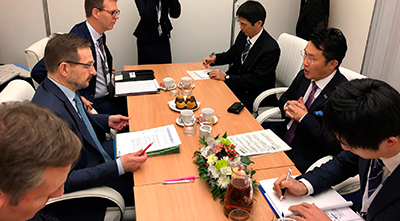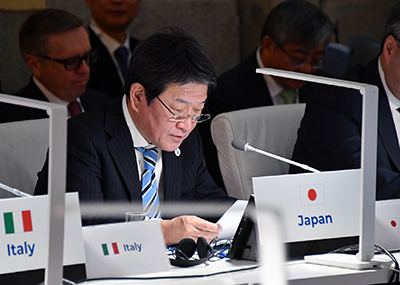Diplomatic Bluebook 2020
Chapter 2
Japan's Foreign Policy that Takes a Panoramic Perspective of the World Map
3 Collaboration with European Regional Institutions, and the Asia-Europe Meeting (ASEM)
(1) Cooperation with the North Atlantic Treaty Organization (NATO)
As a military alliance aimed at providing collective defense for its 29 member countries, NATO provides collective defense for its member countries, and engages in crisis management inside and outside of the region that could pose a direct threat to the security of the territories and peoples of NATO member countries, including security-keeping operations in Kosovo, support in Afghanistan, and counter-terrorism efforts. At the NATO Summit held in December in London, together with reaffirming the commitment to Article 5 of the North Atlantic Treaty concerning collective defense, there were discussions in NATO for the first time about opportunities and challenges brought about by the growing influence of China.
As a partner that shares fundamental values with NATO, Japan is taking specific steps toward collaboration based on the Individual Partnership and Cooperation Programme (IPCP) (revised in May 2018), which Prime Minister Abe signed while visiting NATO headquarters in May 2014. To date, Japan has participated as an observer in NATO's crisis management exercises (CMX), as well as training exercises related to humanitarian assistance and disaster relief (HA/DR). Japan also participated for the first time in the NATO cyber exercise (Cyber Coalition 2019) in December. Japan also dispatched the third round of female self-defense force officials to the NATO headquarters in November in order to promote Japan-NATO cooperation on matters concerning women, peace and security (WPS) and other fields. Through the Partnership for Peace (PfP) Trust Fund, a project that aims to promote arms control and disarmament, as well as democratization and regional stabilization through the utilization of NATO's specialized military expertise, Japan is also providing support to process unexploded ordnance in Ukraine, and help capacity building for demilitarization of Serbia's Ministry of Defense arsenal.
(2) Cooperation with the Organization for Security and Co-operation in Europe (OSCE)
OSCE is a regional security organization with 57 member countries across Europe, Central Asia, and North America, that works to bridge differences between member countries and foster trust through conflict prevention, crisis management, and post-conflict recovery and reconstruction in these regions through a comprehensive approach. Japan has taken part in OSCE activities since 1992 as an Asian Partner for Co-operation. Japan provides support for preventing terrorism through means such as strengthening border patrol in Afghanistan and Central Asia including through the Border Management Staff College (a capacity building organization) in Tajikistan, and also lends support in conducting election monitoring as well as to the projects that support women's social advancement. The OSCE plays an important role in improving the situation in Ukraine. Japan provides financial support to the OSCE Special Monitoring Mission (SMM) and dispatched experts to the SMM from August 2015 to March 2019. Parliamentary Vice-Minister for Foreign Affairs Nakatani Shinichi attended the OSCE Ministerial Council held in December in Bratislava, Slovakia. Together with mentioning the necessity of further strengthening cooperation between the OSCE and Asian partner countries amidst rising interdependence among Asia and Europe, he explained the security environment surrounding East Asia including North Korea and maritime security, and introduced the “Free and Open Indo-Pacific.” Parliamentary Vice-Minister for Foreign Affairs Nakatani also met with Secretary General Greminger of the OSCE, and they confirmed further strengthening of Japan-OSCE cooperation.
 Meeting between Parliamentary Vice-Minister for Foreign Affairs Nakatani and Secretary General Greminger of the OSCE (December 6, Slovakia)
Meeting between Parliamentary Vice-Minister for Foreign Affairs Nakatani and Secretary General Greminger of the OSCE (December 6, Slovakia)(3) Cooperation with the Council of Europe (CoE)
The CoE is a regional organization comprising 47 member states in Europe. It has played a key role in establishing international standards in areas concerning democracy, human rights, and the rule of law. As the CoE's sole observer country in Asia, Japan has made active contributions to a range of CoE activities since it began participating in the organization in 1996. Together with providing financial support for the Octopus Conference 2019 held in November in Strasbourg, France with the goal of promoting international cooperation to tackle cybercrime, Japan conveyed that it would provide contributions in the same area. Japan also dispatched a journalist to the 8th World Forum for Democracy also held in November in Strasbourg who made a statement about the reliability of the media and the impact of information manipulation in Japan, among other matters.
(4) Cooperation through the Asia-Europe Meeting (ASEM)
ASEM was established in 1996 as the sole forum for dialogue and cooperation between Asia and Europe. It currently comprises 51 countries and two institutions, and works through summit meetings, ministers' meetings, seminars, and other activities focused on three pillars, namely (1) politics, (2) economy, and (3) society and culture.
The 14th ASEM Foreign Ministers' Meeting was held by the EU on December 15 and 16 in Madrid, Spain and Minister Motegi attended. During the meeting, Foreign Minister Motegi touched on the Osaka Blue Ocean Vision, the Osaka Track, and the G20 Principles for Quality Infrastructure Investment that Japan led as the G20 President in 2019. He also remarked on the importance of upholding the rules and order of the international community upon which multilateralism is based and keeping these rules updated to cope with social and economic changes, as well as of solving bilateral and multilateral problems in accordance with common rules.
 Foreign Minister Motegi attending the 14th ASEM Foreign Ministers' Meeting (December 15-16, Madrid, Spain)
Foreign Minister Motegi attending the 14th ASEM Foreign Ministers' Meeting (December 15-16, Madrid, Spain)In addition, in regard to the situation in North Korea, Foreign Minister Motegi stated that North Korea's repeated ballistic missile launches violate the UN Security Council resolutions, and threaten the security of Japan and the region. Foreign Minister Motegi called for the necessity of ensuring full implementation of the UN Security Council resolutions, in order to support the U.S.-North Korea process toward North Korea's complete, verifiable, and irreversible dismantlement (CVID) of all weapons of mass destruction and ballistic missiles of all ranges. He also asked for the cooperation of the ASEM member countries toward the early resolution of the abductions issue, the most important issue for Japan. In regard to maritime security, he expressed serious concerns about the current situation in the South China Sea, and emphasized again that Japan opposes any unilateral attempts to change the status quo as well as acts of intimidation against other parties, demilitarization of disputed land features, and the importance of the peaceful resolution of disputes in accordance with international law such as the United Nations Convention on the Law of the Sea (UNCLOS).
The Chair's Statement issued at this foreign ministers' meeting conveys strong messages, including a reference of full compliance to international law, notably UNCLOS, concerning maritime security; a demand for North Korea to bring about CVID of its nuclear weapons, other WMDs, and its ballistic missile programs, and to refrain from further nuclear and ballistic missile tests; and reaffirmation of support for the full implementation of the UN Security Council resolutions concerning North Korea. The abductions issue was clearly set out in the chair's statement following the previous summit meeting and foreign ministers' meeting.
In addition, for cultural and social cooperation, Japan contributed to the activities of the ASEM through the High-level Meeting on Risk Communications for Public Health Emergencies held together with Thailand in Bangkok (September), the Classroom Network Conference held by the Asia-Europe Foundation (ASEF), Sophia University, and others (November), and financial support for the ASEF.

